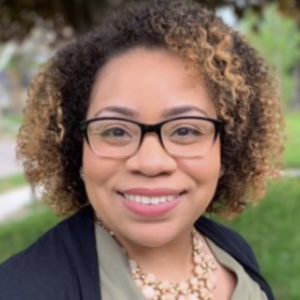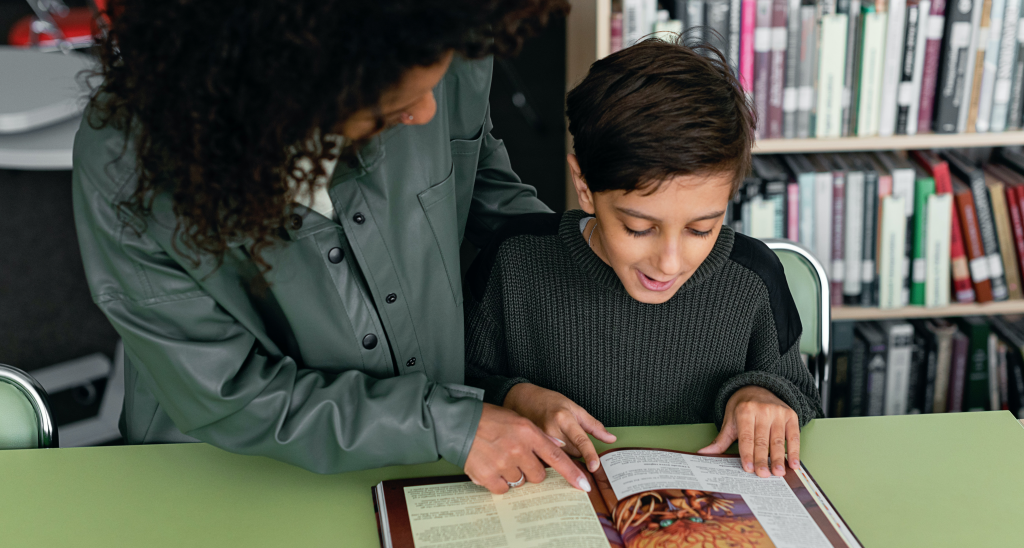
Webinar
Reading as a Social Justice Issue: A Discussion with Jasmine Lane
 Jasmine Lane is a first generation college graduate and an early-career High School English teacher in Minnesota. In her short time in the classroom, and through her own personal history, Ms. Lane knows all too well the negative and life-long impact that poor literacy skills have on students. In her blog, “Literacy: The Forgotten Social Justice Issue,” Ms. Lane shares that her grandfather, Willie Lane, did not learn to read until he was in his 30s because he would have been “attacked, threatened, or possibly murdered for daring to be a Black Man reading in the Jim Crow south.”
Jasmine Lane is a first generation college graduate and an early-career High School English teacher in Minnesota. In her short time in the classroom, and through her own personal history, Ms. Lane knows all too well the negative and life-long impact that poor literacy skills have on students. In her blog, “Literacy: The Forgotten Social Justice Issue,” Ms. Lane shares that her grandfather, Willie Lane, did not learn to read until he was in his 30s because he would have been “attacked, threatened, or possibly murdered for daring to be a Black Man reading in the Jim Crow south.”
Linda Diamond, founder and former president of CORE and author of the Teaching Reading Sourcebook, sat down with Ms. Lane, just a few short weeks after her beloved grandfather passed away, to talk further about how today’s failure to apply the science of reading to instruction continues to put young people, particularly those who have been marginalized and traditionally underserved, at a disadvantage and ill equipped to reach their full potential.
In this 20-minute podcast, Ms. Lane and Ms. Diamond share their passion for the science of reading and how critical it is that educators be taught evidence-based practices for teaching reading so that all children have the opportunity to thrive.
Audio PlayerYou can hear more from Jasmine Lane on her blog, Ms. Jasmine’s Blog. Also be sure to visit CORE’s Science of Reading Virtual Library for more information and resources — including free, on-demand webinars, articles, and whitepapers — about applying the science of reading to instruction.
Podcast Transcript
Linda Diamond:
Thanks for tuning in to this conversation about reading as a social justice issue. I’m Linda Diamond, President of CORE and author of the Teaching Reading Sourcebook. Throughout my career as an educator, I have seen the impact that poor reading skills has on overall academic achievement and the limited opportunities that are then available to young people if, and when they graduate. More than 60% of people who are incarcerated in the United States are functionally illiterate. 85% of juvenile offenders have reading problems.
Linda Diamond:
Statistics like these make IT undeniable that strong reading skills are critical for people to reach their full potential and be healthy, productive citizens. Jasmine Lane is a high school English teacher in Minneapolis, Minnesota, who like me sees literacy as a social justice issue. Though Jasmine wasn’t necessarily taught the science of reading in her teacher preparation courses, she’s come to be a strong advocate for evidence-based reading instruction and writes frequently about equity and reading on her own blog, for Project Forever Free, Ed Week and other publications. I’m pleased to welcome Jasmine to join me in this conversation. Hi Jasmine.
Jasmine Lane:
Hi. Thank you for having me on.
Linda Diamond:
Well, you have an incredibly strong voice about your experiences as a high school educator. Can you tell us a bit about your personal journey and your focus on literacy as a social justice issue? What brought you here?
Jasmine Lane:
So, a lot of my focus now and the things that I work on have to do with how I was taught in my own upbringing throughout K-12. I remember in the really early grades; I remember sitting on the carpet and doing the flashcards and practicing blending words. I remember drilling my math facts and I remember being taught really explicitly. This is how you’re going to succeed, and I’m going to teach you how to do it. And throughout college I eventually decided to become a teacher. People can read about me changing my mind about being a chemist. But, basically, because that was my experience with education, I wanted to make sure that students from my same background also had that just because often times people that come from my background, I didn’t grow up with money at all, by any means, the schools in the neighborhood that I grew up, they’re in the zip code where you can make all those like negative assumptions, but that didn’t dictate my future. And so, I want to make sure that wherever I teach that that’s the same concept for my students. But what I’ve found is that not necessarily every student is getting that same experience that I did with the teacher being very explicit. “This is the standard that we’re going to get to. This is how I’m going to get you there.” And I’ve seen, I’ve come to understand that it does have a lot to do with how we’re trained to teach. And then because of our students’ failure with those methods that we might use, that warps our own understanding of our expectations. And that’s why we get the low expectations coming in. And so, that’s what is just, is every student should get a great education and that’s not what’s happening. And so, that’s why I put my focus there.
Linda Diamond:
Why do you think that is? I mean, what is it that you think created this situation where teachers are not equipping kids with the skills to learn to read? And as a high school teacher, you’re seeing it at the end of the line.
Jasmine Lane:
Yeah. I mean, it’s hard. My original plan was to be middle school just because I knew if these reading issues aren’t addressed earlier on, they’re just going to compound and then you have an 11th grader and you’re trying to teach, Their Eyes Are Watching God and they struggle to decode the basic words. So, it’s harder to do that, but I still am able to do it. And I think, like I said, it starts in teacher prep. Even if you leave there and you get these ideas about what really matters and how we learn, kind of, but it’s really just all based on what we think it should be. So, “let students be free,” “let them roam,” “love them,” which is obviously important, you need to care about your students, but there’s very little attended to, this is how good instruction looks. And it’s more just figuring it out as you go. And when you’re a brand-new teacher or you don’t have any instructional tools, you don’t have curriculum, you’re inundated with lack of behavior plans in your school or whatever else. It just really, really overwhelms you. And so, it’s easy to get caught up in the world of everything going on, and then your instruction just falls by the wayside and you never really get to develop that. And then if you do end up sticking around, maybe you’re a 20-year veteran, you found that what you do maybe works for half of your kids or maybe 40%, or maybe it doesn’t at all and you’re just like, well, I love them anyway. I think that all of those things compound and mask our… I’m trying to find the right way to say it. They can put a damper on what we think that students can do, just because we haven’t been given the tools to really help students who might come in with, maybe they don’t speak English as a first language, or if they have a learning disability or whatever else, for some reason, they’re not at a certain level. We haven’t really been given the tools or the instruction ourselves to know how to move them to where we want to go.
Linda Diamond:
That makes sense. I’m wondering also why there is resistance among teachers to also use evidence-based practices, even if they learn about them. And instead do things like use the cueing system strategies, more whole language, what might be called balanced literacy. What do you think causes that resistance? Or have you thought about that?
Jasmine Lane:
Yeah, I mean, even in the upper grades, there’s evidence for practices for teaching reading outside of decoding and people are resistant to those. And I think it has to do a lot with ego. Unfortunately, as teachers in a lot of spaces, maybe we’re not seen as the professionals that we are. And so, it’s like, how dare you question what I’m doing. And so, it becomes a reflection on us as a person rather than, can our students learn better than what we’re doing? And so, I think that our ego can really get in the way. And then also, if what you’ve done has worked kind of for some students, you might put the idea in your mind, like, well, they’ll get it later or they’ll catch up later without really understanding that they never really do.
And so, I think there’s those two things. It’s one, you kick the bucket and your standards might be, “are they good with their friends? Are they happy in class?” And it’s just like, that’s not really what I come to school for. And so, just changing and shifting the main thing. Eric Colin says this, he’s a really smart education writer and he’s like, “Make the main thing the main thing.” And so, many schools don’t have that. And the main thing for me as an English teacher should be, how can I have my students read rigorous literature? And that’s not the main thing for a lot of schools right now.
Linda Diamond:
That’s very true and we certainly see that. And I think sometimes educators may think that if I’ve got 40% of my kids doing well, it must be the kids or their homes, for those who aren’t learning.
Jasmine Lane:
Right. Yep. And that’s again like, okay, so 40% of my class is doing well and they’re from the same backgrounds as other kids. So, then it’s their home. It’s never the teacher, because again, it’s the ego. It’s like, “I’m doing my best, how can you criticize me?” And so, I think that that really gets in the way. And I understand, but our job is to reflect and say, “Is what I’m doing the very best that can be done?” And the answer is always going to be “no.” I can always get better at something. I can always get better at questioning. I can always get better at chunking the text. And particularly in the earlier grades, if I’m a high school teacher telling you, “Hey, because you taught this student to look at the picture and guess at the word, they came to my class and they guessed the word ‘insidious,’ or sorry, they guessed the word ‘insightful’ when the word was ‘insidious..’ I’m telling you that the strategy you taught them eight years ago is disrupting their ability to comprehend this text.”
And that was a real example. I’ve had a number of students who just look at the first couple of letters and the guess. And I’m just like, “You got to read through the word, you guys.” And this was 10th and 12th grade. And it shouldn’t be that way.
Linda Diamond:
Yeah, that was a good example. And that happens a lot. Now, I was very struck by the particular piece you wrote, where you did directly link reading as a social justice issue, and you talked about your grandfather. Could you talk a little about that and how you saw that connection?
Jasmine Lane:
I’m a black woman in the United States of America. I have a history of slavery in my family. And if you know anything about that, you know that literacy was kept away from my people as a way to oppress them and to keep them… We don’t want to have the slave learning. And so, that is a big deal specifically, for my community, for my family and my own grandfather didn’t learn how to read until his late thirties, because when he was growing up it wasn’t seen as necessary. It was like, you get to about third grade and he couldn’t go to school anymore because he had to go work. So, really all he could really do was just sign his name, maybe do basic things like that, but having full command of literacy and he was a very strong Christian man wanted to read the Bible and he couldn’t.
And so, that was another way to keep that away from him. Keeping knowledge away. And so, I take my strength from him and from my grandmother, too. I am because they were, and education is just such a big thing for my people. And its often people that aren’t from my community telling us that things like reading well, or being proficient at math don’t matter.
And I really just push back on that and reject it, because education is about 80% of white women, middle class white women. And so, that impacts what you think that your students can do. And I’m just here to say there’s nothing very exceptional about me. I didn’t go to private school. I didn’t have private tutoring or anything like that. I went to a regular public school my entire life. I just happened to have teachers that believed in me and taught me and pushed me. And that’s how I got to where I am today. And that’s the issue. There are so many brilliant children all across this country, but there’s no one, or there’s very few people believing in teaching them to their potential. And that’s the issue for me.
Linda Diamond:
You just said that so eloquently and it has to be heard and said more. And that scenario that we’re always trying to work. We work in probably the most disadvantaged schools in the country. We work with the Bureau of Indian Education Reservation Schools, remote schools in Alaska, and urban schools with large populations of African American and English learners. And this is a message that we strive to convey, and you’ve just said it so eloquently and because you have that personal experience, you’re able to bring this into what you do. I’m curious because we’re now in this time of the Common Core Standards where people are looking at core curricula to be the salvation for high school, and just ensuring that if you have a great rigorous core, that that’s all you need. What do you think is needed for students who are very far behind in high school? Is that sufficient? What would you do?
Jasmine Lane:
So, Timothy Shanahan, he wrote a piece, someone questioned him and said if my 10th grader is reading a book that’s at a fourth grade level, but they’re completing at 10th grade standards, is that meeting the standards? And he said, no, you’re meeting a fourth grade standard because you’re reading a fourth grade text. So, don’t try to fake your way into doing difficult standards with an easy book, it’s not the same. And then there’s also some research around this, how to bridge that gap. I had a student that was about six grade levels below reading level last year and my class was really, really a struggle for him just because there was such a large gap between where he currently was and where he could have been. If I’d had him the whole year, I might’ve been able to get him there, but for students that are that far behind, where their decoding is kind of okay, then they would maybe need an intervention class and then eventually move them back into the regular class. We don’t want to just keep kids away from the powerful knowledge or the really good books. We don’t want to dumb it down. And then there were some kids who probably had dyslexia, or their reading was so broken. It was sounding like a broken record player. And so, those kids, again, needing the intervention, but especially in the upper grades, in an upper middle school people just kind of say… You just slip it under the rug and kids just stop reading anyway. And it’s like, you just play the audio book and you just accept that kids are going to struggle to read. And that was the message I got in teacher prep as well. It was just like, kids are going to struggle to read. So, here’s what you can do instead. And I think that that just trickles into our schools, again, compounded with all of those other issues that you might encounter. And that’s why the expectations get lowered the way that they do.
Linda Diamond:
So, that sounds like it’s a compensation strategy. That we’re not going to really give them the skills they missed, we’re just going to find ways to scaffold or compensate, but it’s not necessarily going to make them independent readers.
Jasmine Lane:
Correct. Yeah. I think it’s just like, if they haven’t gotten there by now, it’s something to do with them. Or it’s because they’re poor, because their home was hard. So, let’s just make sure that they feel good about themselves, even though it’s not going to prepare them for life.
Linda Diamond:
Wow. Well, is there anything else that you would like to say about your experience, about your view of these challenges? I really thank you for sharing this with us.
Jasmine Lane:
Yeah. I mean, I think I, in one of my first, first blogs, I said, I’m a progressive educator and I don’t agree with what most of my progressive colleagues are doing because it’s at odds with what most communities that they serve actually want. And so, if you’re a person that says Black lives matter, then that means that Black minds have to matter, too. And I said that in my piece. I said, Black literacy matters, Black grades matter, Black outcomes. If you’re a teacher and you say Black lives matter, all of those things change a little bit when we’re in a school setting. So, you can go out and do a protest or whatever you want to do, that’s great, but if you’re not holding my kids to high expectations and high standards and pushing them to become independent, strong, brilliant learners, like they can be, then you’re performing that wannabe pho-progressive whatever, and just rethink who you’re teaching and why you’re doing what you’re doing.
Linda Diamond:
Well, that’s a very powerful closing statement. And I’d like to really thank you, Jasmine, for joining me today and sharing your story of your journey and clearly your passion for teaching your students to be literate. Thank you.
Jasmine Lane:
Yeah. I mean, they’re just like me. I’m them. When I see my kids, I see myself. So, I got to give them what I had.
Linda Diamond:
Thank you so much.
Jasmine Lane:
Thank you.
Linda Diamond:
If you’d like to continue your own learning about the science of reading or are looking for resources to support your own professional learning or that of your staff, visit the core website, corelearn.com, where you’ll find free on-demand webinars, articles, whitepapers, and a lot of connections to Jasmine’s writings, and much more. Thank you for tuning in.
Speaker 3:
From Cat In The Hat to reading a prescription label. From fractions to following a recipe. From writing an essay to writing a resume. What students learn in school, impacts what they can achieve in life.
Speaker 3:
At CORE, we believe that all students can become strong readers and master math. All it takes is teachers who have a deep knowledge of evidence-based instructional practices and ongoing support to implement them in their classrooms. CORE partners with schools and districts to help educators implement high quality math and English language arts curriculum, rigorous instruction, and effective assessment practices. By supporting teachers in their professional growth, we are ensuring that generations of young people learn to read, write and do math so that all students, especially those who have been marginalized and traditionally underserved, can reach their full potential. Join us in our mission to help every teacher provide an outstanding education for each and every student. Learn more about CORE and our workshops, courses and consulting services at corelearn.com.





